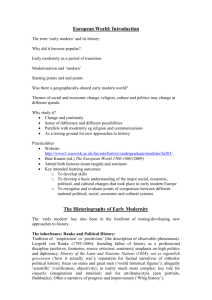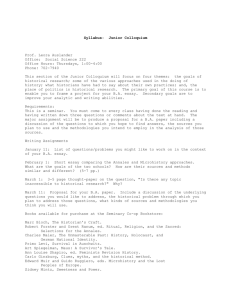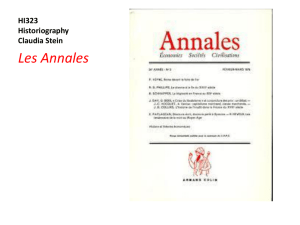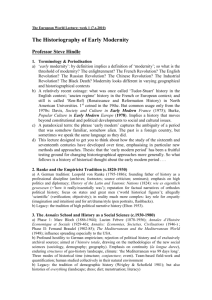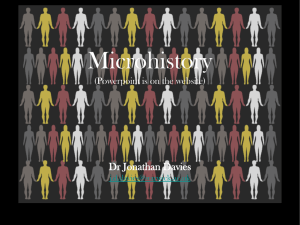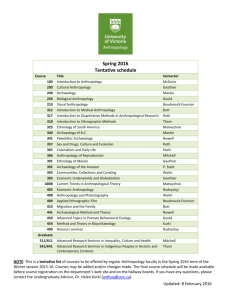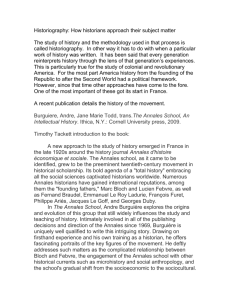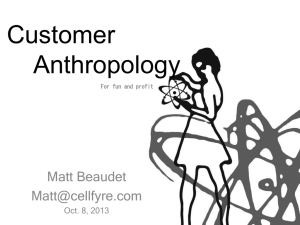Early Modern Historiography
advertisement
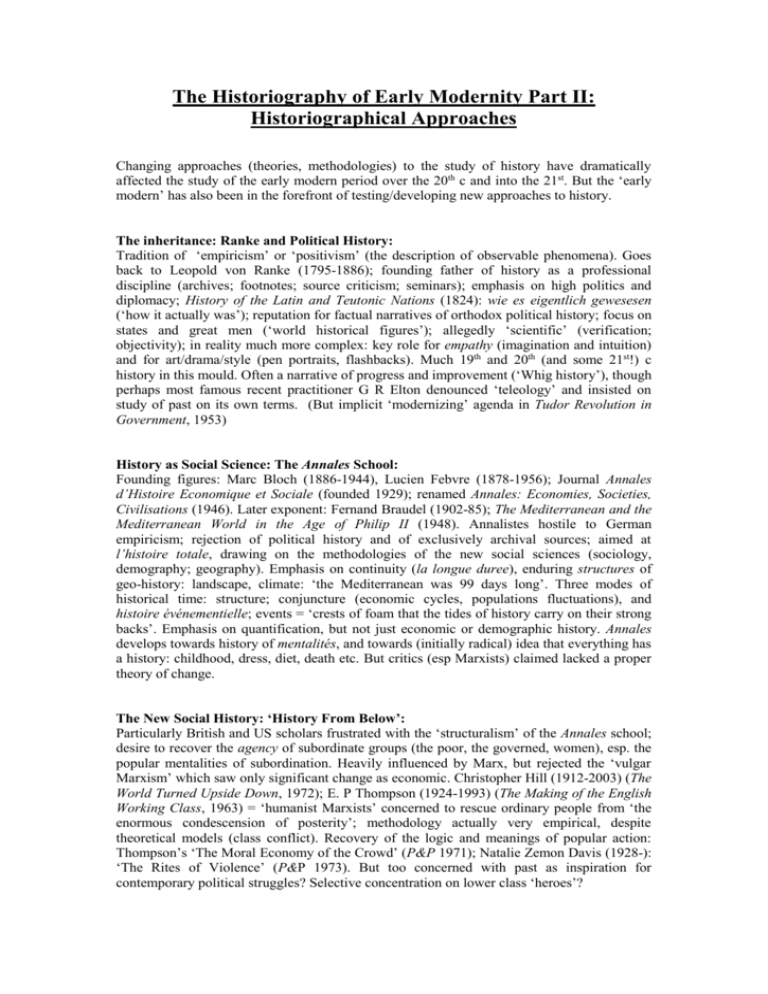
The Historiography of Early Modernity Part II: Historiographical Approaches Changing approaches (theories, methodologies) to the study of history have dramatically affected the study of the early modern period over the 20th c and into the 21st. But the ‘early modern’ has also been in the forefront of testing/developing new approaches to history. The inheritance: Ranke and Political History: Tradition of ‘empiricism’ or ‘positivism’ (the description of observable phenomena). Goes back to Leopold von Ranke (1795-1886); founding father of history as a professional discipline (archives; footnotes; source criticism; seminars); emphasis on high politics and diplomacy; History of the Latin and Teutonic Nations (1824): wie es eigentlich gewesesen (‘how it actually was’); reputation for factual narratives of orthodox political history; focus on states and great men (‘world historical figures’); allegedly ‘scientific’ (verification; objectivity); in reality much more complex: key role for empathy (imagination and intuition) and for art/drama/style (pen portraits, flashbacks). Much 19th and 20th (and some 21st!) c history in this mould. Often a narrative of progress and improvement (‘Whig history’), though perhaps most famous recent practitioner G R Elton denounced ‘teleology’ and insisted on study of past on its own terms. (But implicit ‘modernizing’ agenda in Tudor Revolution in Government, 1953) History as Social Science: The Annales School: Founding figures: Marc Bloch (1886-1944), Lucien Febvre (1878-1956); Journal Annales d’Histoire Economique et Sociale (founded 1929); renamed Annales: Economies, Societies, Civilisations (1946). Later exponent: Fernand Braudel (1902-85); The Mediterranean and the Mediterranean World in the Age of Philip II (1948). Annalistes hostile to German empiricism; rejection of political history and of exclusively archival sources; aimed at l’histoire totale, drawing on the methodologies of the new social sciences (sociology, demography; geography). Emphasis on continuity (la longue duree), enduring structures of geo-history: landscape, climate: ‘the Mediterranean was 99 days long’. Three modes of historical time: structure; conjuncture (economic cycles, populations fluctuations), and histoire événementielle; events = ‘crests of foam that the tides of history carry on their strong backs’. Emphasis on quantification, but not just economic or demographic history. Annales develops towards history of mentalités, and towards (initially radical) idea that everything has a history: childhood, dress, diet, death etc. But critics (esp Marxists) claimed lacked a proper theory of change. The New Social History: ‘History From Below’: Particularly British and US scholars frustrated with the ‘structuralism’ of the Annales school; desire to recover the agency of subordinate groups (the poor, the governed, women), esp. the popular mentalities of subordination. Heavily influenced by Marx, but rejected the ‘vulgar Marxism’ which saw only significant change as economic. Christopher Hill (1912-2003) (The World Turned Upside Down, 1972); E. P Thompson (1924-1993) (The Making of the English Working Class, 1963) = ‘humanist Marxists’ concerned to rescue ordinary people from ‘the enormous condescension of posterity’; methodology actually very empirical, despite theoretical models (class conflict). Recovery of the logic and meanings of popular action: Thompson’s ‘The Moral Economy of the Crowd’ (P&P 1971); Natalie Zemon Davis (1928-): ‘The Rites of Violence’ (P&P 1973). But too concerned with past as inspiration for contemporary political struggles? Selective concentration on lower class ‘heroes’? The Past as a Foreign Country: Historical Anthropology and Microhistory: English historian Keith Thomas (1933-): Religion and the Decline of Magic (1971); Frenchman Emmanuel Le Roy Ladurie (1929-): Montaillou (1975); Italian Carlo Ginzburg (1939-): The Cheese and the Worms (1976) – influence of anthropology (the study of man in ‘primitive’ society); attempt to bring out the strangeness/otherness of the past, and avoid awarding points to those ‘most like us’. Borrowings from anthropology lead in different directions (because different schools of anthropology). Thomas’s approach ‘functionalist’ – what function or purpose for a society do beliefs or rituals perform? Eg witchcraft accusations a means of resolving anxieties about refusal of charity at time of social change. But neglects obligation to explain what beliefs, rituals meant to those who performed them? ‘Cultural anthropology’ of Clifford Geertz (The Interpretation of Cultures, 1973): culture as an integrated system of meaning; symbolic nature of social actions. Geertz’s advocacy of ‘thick description’ an influence on microhistory. Microhistory rejects, grand totalizing or quantitative approaches in favour of detailed studies of individuals or events. Ginzburg’s ‘cosmos of a 16th c. miller’ investigated by the Inquisition; Natalie Davis’, The Return of Martin Guerre (1983). Using ‘microscope’ will reveal underlying patterns, mentalities, structures. Problem of ‘typicality’ – undue focus on the bizarre and abnormal? Edoardo Grendi (1932-1999) notion of the ‘normal exception’. The strange episode as ‘point of entry’ Robert Darnton (1939-) on the significance of ‘not getting the joke’ (The Great Cat Massacre, 1984) The Linguistic Turn: Post Modernism and Post-Structuralism: Micro-history retreats from traditional ‘grand narrative’ history, but a more radical challenge posed by postmodernism: a broader intellectual movement of the 1980s/90s, rejecting ‘naive’ understandings of social reality, and stressing role of language in structuring social action and creating knowledge (and hence power). Esp influential for historians = Michel Foucault (1926-84). Our sources (texts) not a description or reflection of a recoverable truth, but themselves through their inner relationships and tensions construct meaning (death of the author). For historians has lead to focus on representation and discourses, and idea that things we might take for granted (the body, sexual difference) are socially and culturally constructed. Logic of postmodernism destroys history? No recoverable ‘truths’ about the past; texts refer to nothing beyond themselves; no ‘narrative’ intrinsically more reliable or valuable than any other. But in fact, historians able to combine some insights with older traditions of the discipline: Natalie Davis, Fiction in the Archives (1987) – analyses genre, form, structure of French petitions for pardon – not ‘true’ stories, but exceptionally revealing of contemporary attitudes; Stuart Clark, Thinking With Demons (1997) - explores the languages in which witchcraft was described and analysed (by judges, by theologians, by monarchs) – demonstrates how witch-hunting logical on its own terms (not hysteria, a craze, inexplicable). But analysis of ‘discourses’ can become too disengaged from lived experience/human suffering? (c. 50,000 women were burned: more than a ‘discourse’ to them!). Conclusions?: Early modern period a peculiarly effective testing ground for new approaches to the discipline of history; early modern = ‘the cutting edge’! Many borrowings from other disciplines (sociology, anthropology, literary studies) – history a mongrel discipline, able to pick and choose, mix and match. Pragmatic use of theory – we go with what seems to work! Wide range of historiographical approaches now available: histories of power; of experience; of meaning; of ritual; of gender; of the body; of representation. Old subjects (politics, religion) being reconceived in new ways. No agreed methodology for best way to do early modern history (even within the Warwick History Department!) But important thing is to be reflective in approaching the surviving traces of the past: we think about what we are doing, and why we are doing it this particular way. Peter Marshall Oct 2011
